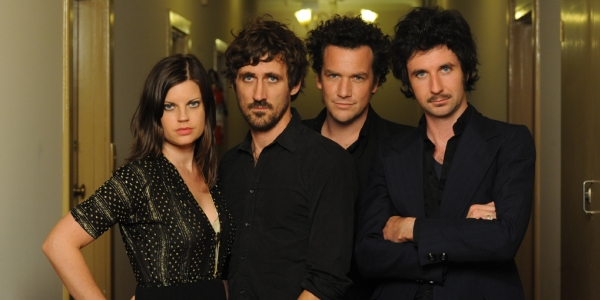“It took seven, nearly eight years,” Luscombe laughs. “I know how Ronnie Wood felt. He had to wait thirty or something years before that guy that nobody can remember joined the band to replace Bill Wyman. Stevie’s been a huge contributor musically and personality-wise to the band. He’s hilarious. We used to live together, Stevie and I, in our mid-20s. I remember he once gaffer-taped a telephone to my head when I was talking to my mum. And I think he pulled my pants down. That’s the kind of guy Stevie is. It’s good to have him in the band, and I’m looking forward to getting my revenge now I’ve remembered it.”
After briefly emerging from what could be classified as hiatus in 2011 to celebrate the launch of DVD compilation A Thousand Mistakes, The Drones are back this year with a reinvigorated focus – having released a long-awaited new album, curated the return of ATP to Australia, toured fairly extensively and fulfilled a slot on the Splendour On The Grass bill. However, the pace of their return is far more measured than previous touring cycles. “It feels more relaxed than it’s ever felt for us. It feels like we’ve got through a very difficult adolescence or something, now we can relax and be adults. When I joined the band it was pretty much immediately on the road for four or five years, and we didn’t really stop a lot during that time. The fact that we didn’t literally murder each other is kind of a miracle. With that behind us, knowing we can come through something like that, it just solidified our relationship as people. It also made us very instinctive live players. We would be doing over 100 shows a year. When you go through something like that, the muscle memory doesn’t leave you. You also develop a keen sense of what everybody’s doing up there, or more importantly, about to do. I think it’s helped us become a good live band. That opportunity to go out and play that amount of shows in Australia isn’t easy, unless you want to disappear into regional touring for the rest of your life, or head overseas and keep busy over there,” he reasons.
“Most bands in Australia at a certain level find that they run out of cities to play pretty fast. We were fortunate that the four of us didn’t really have any ties here. Gaz and Fi obviously had each other, Mike and I were single, none of us had mortgages. We looked at the situation and decided to uproot. We didn’t really live anywhere for a while, I crashed at my brother’s when I was in Melbourne. It was a very itinerate life for a few years. The benefits of doing that mean you should become a good band, but the downside is that you don’t have much of a life for a while. That’s why we took a really long break between this album and the last. It became obvious to everyone in the band that we needed to step away for a while and get some semblance of a normal life – to put your name on a bond for a change. With all that behind us, then having a good time making this record, it was nice knowing the break served us well. It was also nice knowing that the worst of our behaviour was behind us. We’re not as volatile characters as we used to be, we don’t snap or argue with each other anymore. Just a bit more chilled out.”
With that renewed focus, Luscombe can’t envision a need for The Drones to take another elongated break anytime soon. “The thing that’s going to stop us these days is people losing interest, because we’re not going to lose interest any time soon. We’re really enjoying the music that we’re making now. There always will be that brutal aspect, I think it’s going to get a lot weirder, I reckon. We’ll start making another record once this tour is done. I don’t know how it’s going to sound, but we didn’t know how the last one was going to sound. It could be acoustic ballads, or it could be something like Merzbow,” he says, referencing the abrasive Japanese experimentalist. “The other fun thing about this band is that every record is kind of different to the last. There are common threads, but I like the unpredictability of it all.”
BY LACHLAN KANONIUK

